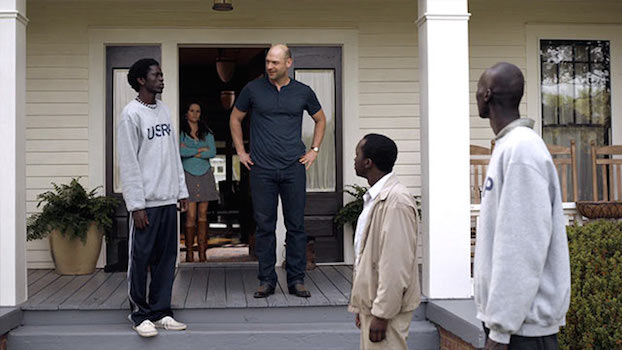I smell Oscar bait…
The H-Bomb: Civil war breaks out in Sudan in the 1980’s, and a small band of orphaned children are forced to flee on foot after their village is wiped out in a raid. It’s a long, arduous journey through hundreds of miles of wilderness that claims the lives of a number of these kids. The few who do make it to the Kenyan border wind up in a U.N. refugee camp, where they are given food and medical attention.
Cut to circa 2001, the four surviving kids who made that journey are now grown and still living in the camp. The “leader” of the group, Mamere (Arnold Oceng), aspires to be a doctor and hopes to eventually immigrate to America with his sister, Abital (Kuoth Wiel), and fellow refugees Jeremiah (Ger Duany) and Paul (Emmanuel Jal). After years of waiting, he finds their names on a list for a flight to the U.S., as part of a church sponsored program to bring refugees over and help them start new lives in the States.
Upon their arrival, Abital is immediately separated from the guys and sent to Boston, since program rules dictate that the girls must live with families, and the men are sent to Kansas City. As distressed as they are about being split from Abital, that’s nothing compared to how overwhelmed they feel once they get a gander at this land of plenty, filled with McDonald’s, automobiles, running water, and strange contraptions called telephones.
Assigned to assist these new arrivals is Carrie (Reese Witherspoon), an employment agency worker tasked with finding them jobs. She soon realizes that this will be easier said than done, as Mamere and his friends have some serious readjusting to do, and they will require a little more time and attention than Carrie is accustomed to giving. Also, Mamere is determined to have his sister re-united with them in Kansas City, but since their arrival, 9/11 has happened, which creates whole new bureaucratic issues in getting her reassigned to a new city.
From the trailer and the posters for The Good Lie, which had Witherspoon’s name and visage plastered all over them, I was expecting another “Great White Savior” movie. Helpless, downtrodden people of color wandering hopelessly and cluelessly until an inhumanly generous white person, with a heart of gold, comes along, shows them the way, and saves the day. Thankfully, while there is unavoidably a bit of that in the picture, the film is really about these young men learning, persevering, and finding their own way.
Yes, this is very much a Hollywood-ized take on “The Lost Boys of Sudan”, that follows the predictable arc of Carrie helping the refugees, the refugees helping Carrie, and everyone emerging a better person at the end. To that extent, The Good Lie is feel-good formula filmmaking through and through. Funny at times, with numerous fish out of water sequences of the Lost Boys adapting to this developed society, sad at others, with one of the boys developing a substance abuse problem, and all of them recounting the horrors of growing up in Sudan.
The film is at its strongest when director Philippe Falardeau (Monsieur Lazhar) depicts, with a realistic, unflinching eye, the ugliness of war-torn Africa, showing in graphic detail the lengths these kids have to go to in order to survive. This opening half hour is quite harrowing, and when the story relocates to the States, and the light-hearted foreigner hijinks ensue, it does slightly lose a step. The movie doesn’t fall apart, per se, so much as the rest of it just sort of pails in comparison to that opening act. Kind of like Full Metal Jacket.
Anyhow, the film remains engaging due, in no small part, to the lead performances. I’m not referring to Witherspoon, who is solid, but very much a supporting player here, despite her top billing. The real stars are Oceng, Duany, and Jal, the latter two being actual Sudanese refugees. All three actors deliver terrific turns, embodying their characters with warmth and dignity, as well as a sense of wonder and bewilderment towards the strange new world they’ve been dropped into. Oceng, in a potential star making performance, particularly shines as Mamere, the central figure of the group, who the others look up to, and who is forced to make a difficult decision late in the proceedings.
It’s that late story turn that gives the film its title, and that makes the ending a bit pat and a smidge unbelievable. That, and the faint scent of Oscar bait, are the movie’s greatest shortcomings, though they don’t come close to ruining the picture. The Good Lie is, overall, an old-fashioned feel good movie about humanity, generosity, and overcoming adversity. As stated, it is very polished and very “Hollywood” in its approach (the opening half-hour aside). For that reason, it probably won’t rake in the awards and accolades that a grittier, more docudrama-styled take on the subject would, but as crowd pleasing entertainment, The Good Lie does its job, and does it well.




